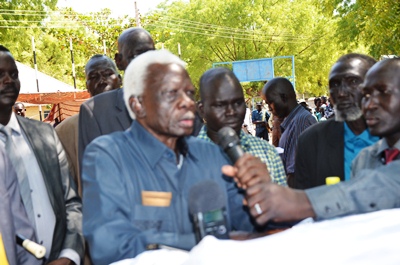South Sudan national dialogue co-chairs says will reach hold out opposition
May 23, 2017 (JUBA) – Abel Alier, co-chair of the National Dialogue stressed the importance of reaching out to armed and non-opposition forces to ensure inclusivity, steering away from the views of President Salva Kiir who had directly advocated for a selective participation process.

The co-chair pointed out that the committee would organise the dialogue process around a constituency-based system, which consists of multiple forums and levels. The system would be top-down and bottom-up.
According to Alier, the top-down approach would require as a matter of urgency, ending the violent conflict that has devastated the country. Whereas the bottom-up would start at on a community level, through local dialogue forums where intra and inter-communal grievances would be addressed. The communities will then be able to select their own delegates to their respective National Dialogue forums through a system of congress.
A regional dialogue forum would also be in place so that regional issues can be discussed. The National Dialogue forum would be the final phase in which all the issues are discussed and resolved through consensus. The secretariat of the steering committee would then produce the details of the constituency-based system in which the stakeholders select their own delegates.
Meanwhile, Anjelo Beda Bangboru, the co-chair of the National Dialogue steering committee, said that though the struggle for independence was a result of the efforts and roles played by the ruling Sudan People’s Liberation Movement (SPLM) with its military wing Sudan People’s Liberation Army (SPLA), the Anyanya and the 1955 Torit Uprising, the dialogue would eventually prevail over the war.
“Your Excellency, I would like to state the fact that as hard as fighting was, and as long as our 20 years or more struggle continued, we finally got our independence, at last. It is now, your Excellency, the President, that in this spirit after 60 years you have found that the task of nation building is a very difficult one, as difficult as the fighting was, if not more,” said Beda.
He continued to say that an inclusive dialogue would be what they would advocate, stressing that they would invite all the stakeholders comprising of women, youth and opposition forces from outside the country.
“There have been many critics, but you cannot oppose when the roads to Yei, Yambio, Wau and Tombura are closed. This has to be resolved. The credibility and genuineness of the National Dialogue depend on its inclusivity, to make it open to all the people of South Sudan both inside and outside the country,” said the ageing veteran politician.
Beda pointed out the fact that the dialogue would be credible if President Kiir relinquished his patronage role over the process, making it more credible and guarantying the safety of all participants.
“It will be an important step especially that if there is a political will that the government will not lead or control the process, greatly increase the credibility of the National Dialogue,” he lamented.
(ST)
